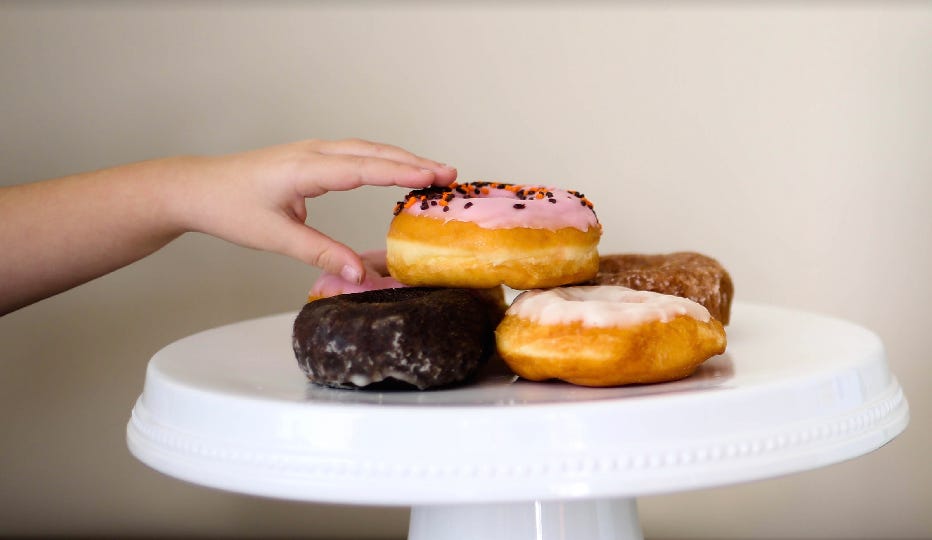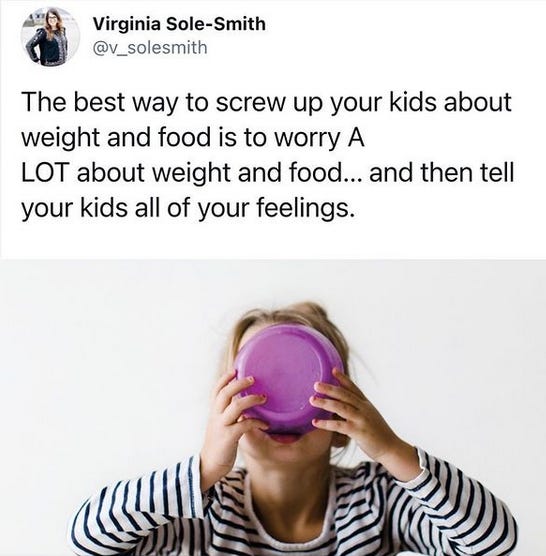This is the first of a series of Q&As I’m adding to this newsletter, tackling issues like how to feed your kids, combat diet culture in schools and family life, and navigate fatphobia (your own and other people's). Got a question you'd like me to tackle? Hit reply and send it over.
Q: What do you do when siblings fight over who ate up more than their share of snacks, or dinner or whatever? To be clear: There is PLENTY of food; it's just a choice thing and a fairness thing. I am very uncomfortable with kids fighting over food — but maybe that is my problem? (My siblings and I also did this — maybe it's normal?)
A: Reading this note reminded me of the time my own children brought one another to tears not just fighting over food but fighting over who got to hold an EMPTY POTATO CHIP BAG. So yes, I'm here to say: Siblings arguing about food is normal because siblings arguing about everything is normal. That said, sibling food fights are not fun and they can sometimes be a symptom of a family's heightened stress around food. So it's worth looking into the larger context.
I know you said there is plenty of food, but first let's touch on the fact that in food insecure households, siblings might fight because there isn't enough to eat, or enough of certain foods to go around. But one researcher once told me that she worried more about low-income families where this didn't happen, because it meant food insecurity had become the norm. Parents and older siblings will usually go to great lengths to ensure younger children do not go hungry when food is scarce. So they may not be fighting over food because the older kids have gotten used to skipping meals and see that as a way they can help out. This is, obviously, horrible. (If your family is in need of food, go here for help. If you're not in need, go here to help others.) And if you grew up in that context, it may be especially stressful for you to see the same dynamic pop up with your own kids, even without the same root cause.
But even without true food insecurity as a factor, it's worth considering whether your kids are getting subtler messages about food restriction that could trigger a similar scarcity mindset. When you put a plate of hot-from-the-oven cookies on the table, is there a mad rush to eat them because they know that you'll cut them off after one or two? Are they used to hearing you deprive yourself of a treat because you haven't "earned" it, or allowing yourself to indulge only after a hard workout has made you feel deserving? If you have a child in a bigger body, they may be aware of your anxiety about their weight — and that's going to show up in their relationship to food.
There was a lot of "but what are you doing" in those examples, and I'm not here to parent-shame, so let me also say: It may not be you at all. Kids can also get these messages from another parent or caregiver, from school, or just from our wider, food-phobic culture. Whatever the source, working to consciously counter-program those messages is step one to reducing their anxiety. Start by implementing the basic tenets of the Division Of Responsibility model, which can be game-changing. If you put yourself in charge of what and when kids eat, but leave them entirely responsible for how much, you may see them feeling less anxious about whether they're getting enough because they know they can always eat their fill. (More on DOR here if that's a new concept for you.)
If letting kids eat their fill will be a big shift in your house, you'll want to lay it out pretty clearly — and then stick to it no matter how many muffins your kids inhale at snack time, or how many helpings of pasta they want at dinner. It's going to take a little time for them to trust you and start to connect back to their own innate sense of hunger and fullness. If they start to get distracted by what their sibling is eating, you can emphasize (possibly repeatedly), "there is enough here for everybody, so let's just worry about our own plates." It's good manners, and also a good intuitive eating practice, to discourage kids from commenting on how other people eat — so feel free to set this as a ground rule at your family table. Another useful rule is "everyone gets firsts before anyone takes seconds." And if your kids tend to eat at dramatically different speeds, you can also institute a policy of asking, "does anyone want more of X before I finish it?" (Note: Make sure adults follow these rules too! Also not here to dad-shame, but I often notice that men are quick to assume they get the biggest/best portions, or that it's fine to grab a half-eaten cookie off their kid's plate, and no wonder your kids are fighting in that scenario.)
If your kids are old enough to discuss all of this, I would also probe into what they think about the recent sibling food fights. It may be more of a symptom of where they are developmentally in their relationship with each other than anything to do with food. (See above re: arguing over literal garbage.) Then you'll want to focus more on giving them tools to manage those conflicts; I love Melinda Wenner Moyer's strategies on that.
But even after implementing DOR and working through sibling conflicts in general, you may notice that there are certain favorite foods that just always get your kids amped up about having enough. For some reason, it's often condiments — I don't have definitive data, but there appear to be a not insignificant number of children who would happily eat an entire bowl of ketchup for dinner, or gnaw on a stick of butter like it's cheese — or, of course, any treat foods you serve less frequently. It's an understandable knee-jerk response to want to remove these foods from your life entirely, to throw up your hands and say "my kids just can't handle sugar!" But I wouldn't. Because they're going to encounter these foods in the world eventually, and you want them to have the skills to navigate them when that happens.
So instead, lean in. Serve those foods more frequently. This might look like offering ketchup with a spoon at every meal, baking brownies every weekend, or, serving ice cream every single day for their afternoon snack. Although I often endorse serving meals family-style, it can help to pre-plate everyone's servings when you’re doing this, so kids can see what's all theirs and feel reassured. Just be sure to dole out a little more than you think they'll want; this isn't license for sneaky portion control! Humans have a powerful ability to habituate to foods, so after a few days or weeks, your kids will be much less hyper around those foods, which means they'll care less about what their sibling is eating, too.
Who gets to hold the empty potato chip bag though, is a mountain they will die on forever.
ALSO
Hi new subscribers! I had the pleasure of speaking with Emily Oster of ParentData about how to think about body changes in kids during the pandemic, and how to talk about food and weight with kids without passing on our issues around diet/food/weight. I know a lot of you are joining me from Emily’s list — welcome, and thank you!
For everyone else: We talked about lots of research on kids, food and weight. Two key themes: How we can find ways to connect over food without policing food, and remember it's not our job to control their weight. Listen here.
You're reading Burnt Toast, Virginia Sole-Smith's biweekly newsletter. Virginia is a feminist writer, co-host of the Comfort Food Podcast, and author of The Eating Instinct. Comments? Questions? Email Virginia.
If a friend forwarded this to you and you want to subscribe, sign up here:





